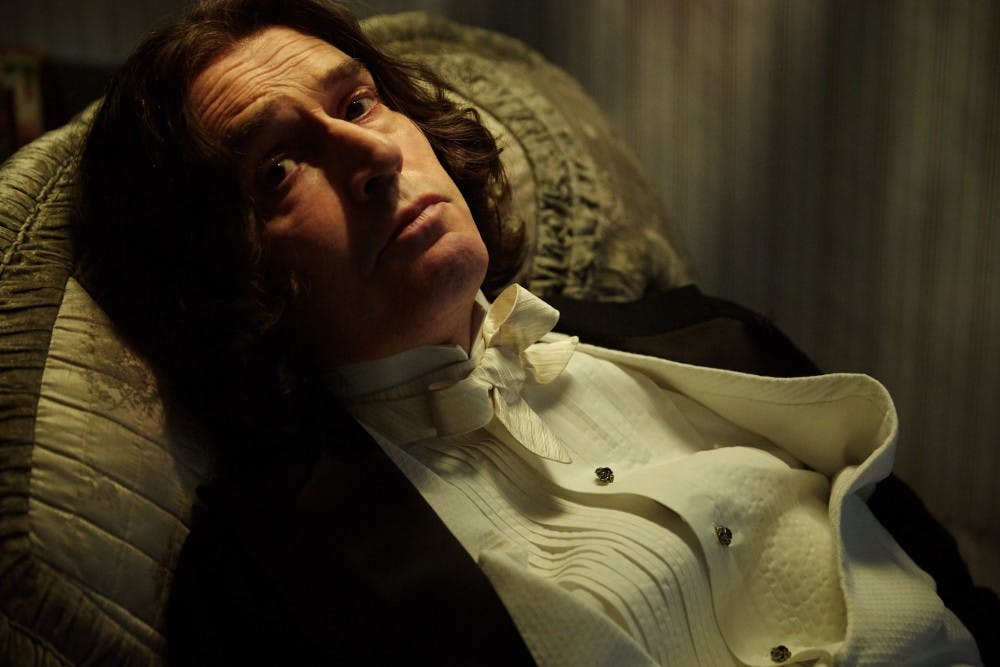Rupert Everett’s The Happy Prince is self–indulgent. It’s what Everett considers to be his magnum opus: he directs, writes, and stars as the legendary Oscar Wilde in a story about the final years of his life, something which Everett has been interested in for years. His foray with Wilde’s works begins in The Importance of Being Earnest (2002) and continues with his first portrayal of Wilde in David Hare’s The Judas Kiss. It’s clear that The Happy Prince is a work of love, but it seems more like Everett made the work for himself rather than for audiences.
The Happy Prince begins where most Oscar Wilde films end. The famous Wilde (1997) starring Stephen Fry and Jude Law ends with an epilogue describing the titular character’s final years and death; instead, The Happy Prince starts off with explaining the previous extent of his life and begins with Wilde in his decay.
This fall from glory is depicted with about the subtlety of a baseball bat. Wilde first stands before the mirror and applies reddish makeup to his cheek and lips then proceeds to offer cocaine and money to a young man in exchange for sex. He drinks absinthe and parades about the place before collapsing on the floor, blood and bruises over his face. This is not the same glorious, delightful poet that we know and love, Everett says again and again; he has fallen, and will only continue to fall more.
The first scenes are useful in setting up the story, but from there, the through–line becomes muddled. There are cuts between three separate scenes at once, jumping to Wilde’s sentencing, his speech before a performance of his play, and him singing in a seedy club in the relative present. This habit of too many scenes getting edited together is present throughout the film and it makes the whole production seem out–of–order and confused. Even knowing somewhat of Wilde’s pathway, the attempt to do quick cuts between related scenes with latent imagery does not work the first time it is used and becomes a dreadful mess by the second and third. This technique, clearly, was used to create chaos in the viewer, but we, unlike Wilde, can never recover; I can never tell if we are in the present or the past, a dream or reality. It is poetic, certainly, but hard to follow.
There are shining moments in the piece, however, despite this messiness which I mostly blame on editing and production. The ensemble is a bunch of talented actors: Colin Morgan is a perfectly bratty Bosie, Colin Firth a careful and age–worn Reggie Turner, and most profound is Edwin Thomas as Robbie Ross, a lifelong friend of Wilde’s who yearns desperately for Wilde’s attention to no avail throughout. The most electric scenes are between these three: Reggie and Robbie discussing Wilde’s deterioration in hushed whispers, Robbie and Bosie fighting over Wilde’s love and placing blame on each other, the three of them watching Wilde in silence and half–frightened awe.
Despite this skilled ensemble, the undercurrent of their scenes is a lack of direction. Everett himself has admitted that he didn’t want to direct and it is clear that this is his debut in such a respect. It is particularly notable in scenes where it is just Wilde and his friends around him; while Firth and Thomas work off of their instincts, they still need further instruction for the scene to work as a cohesive art. It is always hard for lead actors to direct their costars, which makes me wary when I see Everett billed for both roles (as well as the writer). Everett needed a separate director for the film to work, especially with himself as the lead, because such a dynamic piece requires an outside eye to keep the delicate balance between the pomp of the Victorian era and earnestness of the characters.
The Happy Prince, like most films about Oscar Wilde, fumbles in the face of his wife, Constance (Emily Watson). She is also decaying, an older woman who we know will die soon enough, but its focus on her and her subsequent death feel awkward, like the director is trying to make a point about the frank tragedy of it but doesn’t quite understand what that point is. There is also some vague point in all of the dream sequences and the poetry in French and the quick cuts between things, but it was lost and me and likely most of the audience. This was not a film made for someone who only knows the outline of Wilde’s life and wishes to know more, because it in itself is too busy making some artistic gesture to care.
This is not to say that I hated the film: it was simply too caught up in the imagery to be followed. This in itself seems like some grand Wilde–esque irony, too much imagery and dramatic shaky shots instead of the story itself. Thomas’ Robbie Ross is undoubtedly the strongest part of the film and Everett’s direction the weakest, but it is something interesting to watch, one man’s pride and joy laid before on the screen before you. Some scenes are unbearable and some are genuinely well–crafted, but The Happy Prince suffers, perhaps, from too much attention and care from its director, writer, and star, who got the image of the film too built up in his head to understand how it truly appeared.







